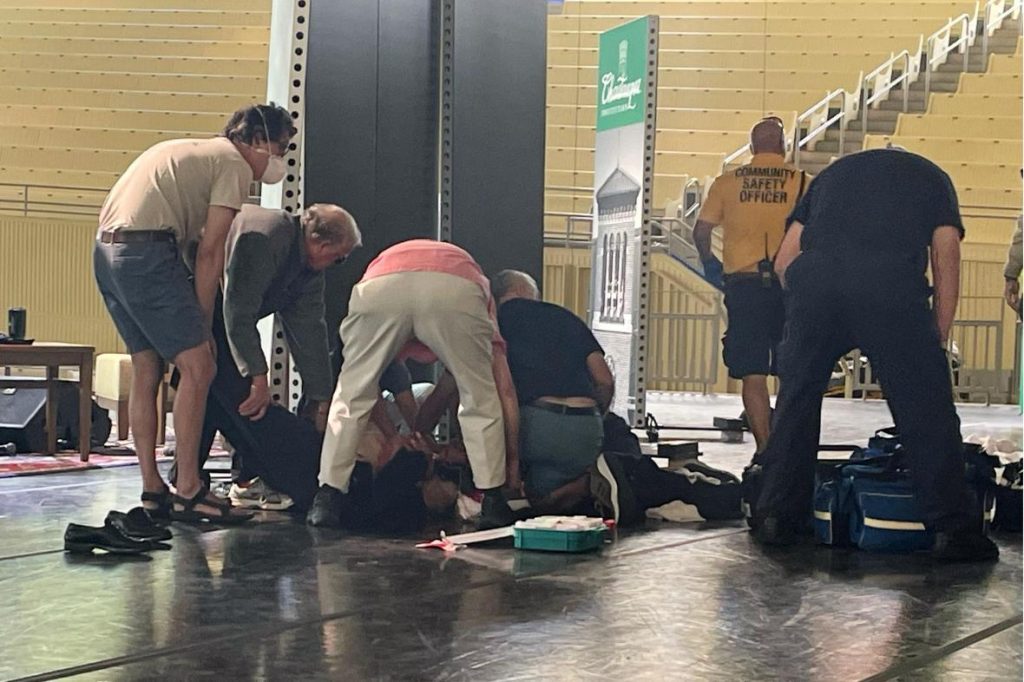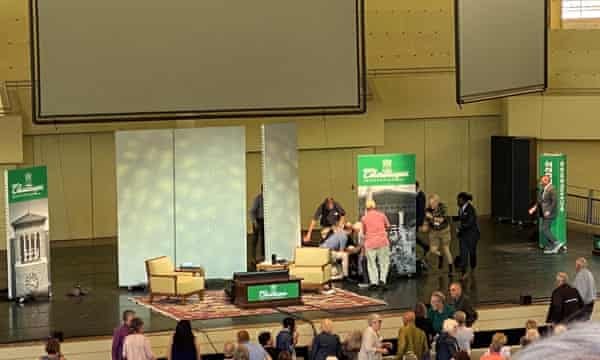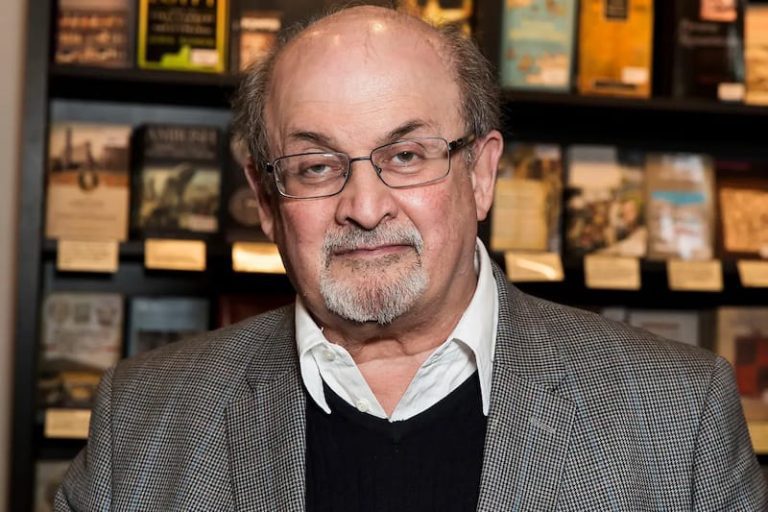The author of The Satanic Verses, Salman Rushdie, is currently battling for his life in a hospital after being stabbed in the neck on Friday in New York.
He has been placed on a ventilator.
Rushdie was stabbed in the neck at a literary event in upstate New York Friday.
According to the police, a suspect named Hadi Matar, 24, from Fairview, New Jersey, stormed the stage and stabbed Rushdie, who was scheduled to talk at the Chautauqua Institution in Chautauqua, N.Y., some 75 miles south of Buffalo.

Stunned attendees helped wrest the man from Rushdie, who had fallen to the floor. A New York state police trooper providing security at the event arrested the attacker.
“A man jumped up on the stage from I don’t know where and started what looked like beating him on the chest, repeated fist strokes into his chest and neck,” Bradley Fisher, who was in the audience, said.
“People were screaming and crying out and gasping.”
A doctor in the audience helped tend to Rushdie while emergency services arrived, police said.
Rushdie’s interviewer, Henry Reese, 73, was also attacked and suffered a minor head injury, police said.
Rushdie’s agent, Andrew Wylie, said “Salman will likely lose one eye; the nerves in his arm were severed; and his liver was stabbed and damaged.”
Though there were no immediate, previous threats before that event, authorities believe he acted alone and there is not yet any indication of the motive of the attacker.
Authorities also said in a press conference that it is working to determine charges against Matar.
The White House national security adviser, Jake Sullivan, described the attack as “appalling”.
He wrote on Twitter: “We’re thankful to good citizens and first responders for helping him so swiftly.”
Rushdie, author of 14 novels, had been invited to talk about the importance of the US offering asylum for writers and other artists in exile.
Eyewitness reports said that a man wearing a black mask rushed onstage and began to attack Rushdie as he was sitting on the stage.
Paula Voell, a retired journalist, told the Buffalo News that it was quickly apparent that an assault had taken place.
“We saw the man race a few steps across the stage and there was horror – the whole audience reacted, and probably 15 spectators raced on to the stage to try to attend to him, or so it seemed,” she said.
The New York Post, citing law enforcement sources, described the suspect Matar as being sympathetic toward the Iranian government.
At a news briefing late Friday, authorities said a motive for the attack was unclear.
Journalists, writers and celebrities reacted with shock and concern. Horror novelist Stephen King tweeted: “I hope Salman Rushdie is okay.”
Indian author and political and environmental activist Arundhati Roy told the Guardian: “I am shocked and saddened beyond measure. Nothing can justify this attack.”
Close friend Nigella Lawson, the English food writer and celebrity television cook, wrote: “Such shocking news of Salman Rushdie having been stabbed. This is horrific. Am distraught. Please, please let him be ok.”
Speaking to the Guardian, Japanese-born English novelist Kazuo Ishiguro said: “He’s been incredibly brave through all these years, continuously putting himself on the line for the right to think and speak freely, despite the dangers that never went away. We’re hoping and hoping he’ll pull through.”
The president of France, Emmanuel Macron, tweeted, “For the last 33 years, Salman Rushdie has symbolised freedom and the fight against obscurantism. Hatred and barbarism have just struck him, so cowardly. His struggle is ours and universal. Today, more than ever, we are at his side.”
Rushdie is a multiple award-winning novelist, whose fame goes beyond borders and break boundaries, even though his freedom has been restricted since he published the surrealist, postmodernist novel, Satanic Verses in 1988.
The book title refers to two verses removed by Prophet Mohammed from the Koran because he believed they were inspired by the devil.
The Satanic Verses not only got him a fatwa (a decree calling for the writer’s assassination), which then Iranian Spiritual leader Ayatollah Ruhollah Khomeini issued in 1989, a year after the book was published, it brought about international turmoil unprecedented in its scale.
A bounty of $2million has also been offered for anyone who kills Rushdie.
In 2012, a semi-official Iranian religious foundation raised the bounty for Rushdie from $2.8m to $3.3m.
Rushdie dismissed that threat at the time, saying there was “no evidence” of people being interested in the reward.
That year, Rushdie published a memoir, Joseph Anton, about the fatwa.
The 75-year-old had reported that he still received a “sort of Valentine’s card” from Iran each year on 14 February letting him know the country has not forgotten the vow to kill him and has jokingly referred to it as my “unfunny Valentine.”
The book was banned in many countries with large Muslim communities (13 in total: Iran, India, Bangladesh, Sudan, South Africa Sri Lanka, Kenya, Thailand, Tanzania, Indonesia, Singapore, Venezuela and Pakistan).
Since then the 75-year-old writer has not slept with his two eyes closed. Death threats were made against him, and he was forced to go into hiding.
The British government placed the writer under police protection.
The UK and Iran broke off diplomatic relations, but throughout the Western world authors and intellectuals denounced the threat to freedom of expression posed by Muslim reaction to the book.
When, on BBC Radio 4, he was asked for a response to the threat, Rushdie said, “Frankly, I wish I had written a more critical book,” and “I’m very sad that it should have happened. It’s not true that this book is a blasphemy against Islam.
I doubt very much that Khomeini or anyone else in Iran has read the book or more than selected extracts out of context.”
Later, he wrote that he was “proud, then and always”, of that statement; while he did not feel his book was especially critical of Islam, “a religion whose leaders behaved in this way could probably use a little criticism.”
In January 1989, Muslims in Bradford ritually burnt a copy of the book, and newsagents WH Smith stopped displaying it there. Rushdie rejected charges of blasphemy.
In February of the same year, people were killed in anti-Rushdie riots in the sub-continent, the British embassy in Tehran was stoned, and a $3m bounty was put on the author’s head.
Meanwhile, in the UK, some Muslim leaders urged moderation, others supported the Ayatollah. The US, France and other western countries condemned the death threat.
Rushdie – by now in hiding with his wife under police guard – expressed his profound regret for the distress he had caused Muslims, but the Ayatollah renewed his call for the author’s death.
The London offices of Viking Penguin, the publishers, were picketed, and death threats were received at the New York office.
But the book became a bestseller on both sides of the Atlantic.
Protests against the extreme Muslim reaction were backed by the EEC countries, all of which temporarily recalled their ambassadors from Tehran.
But the author was not the only person to be threatened over the book’s content.The Japanese translator of The Satanic Verses was found slain at a university north-east of Tokyo in July 1991.
Police said the translator, Hitoshi Igarashi, who worked an assistant professor of comparative culture, was stabbed several times and left in the hallway outside his office at Tsukuba University.
Earlier that same month, the Italian translator, Ettore Capriolo, was stabbed in his apartment in Milan, though he survived the attack.
Rushdie’s other books include Midnight’s Children, which earned him the Booker Prize in 1981, a novel for children, Haroun and the Sea of Stories (1990), a book of essays, Imaginary Homelands (1991), and the novels, East, West (1994), The Moor’s Last Sigh (1995), The Ground Beneath Her Feet (1999), and Fury (2001).
He was involved in the stage adaptation of Midnights Children in 2003.
In the last two decades, he has published Shalimar the Clown, The Enchantress of Florence, Two Years Eight Months and Twenty-Eight Nights, The Golden House and Quichotte.
Rushdie has been married four times, and has two children.
He now lives in the US and was knighted in 2007 for his service to literature.
In 2012, he published a memoir of his life in the wake of the controversy over The Satanic Verses.
Salman Rushdie was born on 19 June 1947 in Bombay, two months before Indian independence from Britain.
At 14, he was sent to England and to Rugby School, later gaining an honours degree in history at the prestigious Kings College in Cambridge.
He became a British citizen, and allowed his Muslim faith to lapse. He worked briefly as an actor – he had been in the Cambridge Footlights – and then as an advertising copywriter, while writing novels.

His first published book, Grimus, did not achieve huge success, but some critics saw him as an author with significant potential.
Rushdie took five years to write his second book, Midnight’s Children, which won the 1981 Booker Prize.
It was widely acclaimed and sold half a million copies.
Where Midnight’s Children had been about India, Rushdie’s third novel Shame – released in 1983 – was about a scarcely disguised Pakistan.
Four years later, Rushdie wrote The Jaguar Smile, an account of a journey in Nicaragua.
In September 1988, the work that would endanger his life, The Satanic Verses, was published. The surrealist, post-modernist novel sparked outrage among some Muslims, who considered its content to be blasphemous.
India was the first country to ban it. Pakistan followed suit, as did various other Muslim countries and South Africa.
The novel was praised in many quarters and won the Whitbread Prize for novels. But the backlash to the book grew, and two months later, street protest gathered momentum.
Rushdie’s work often combines magical realism with historical fiction and primarily deals with connections, disruptions and migrations between Eastern and Western civilizations, set on the Indian subcontinent.




